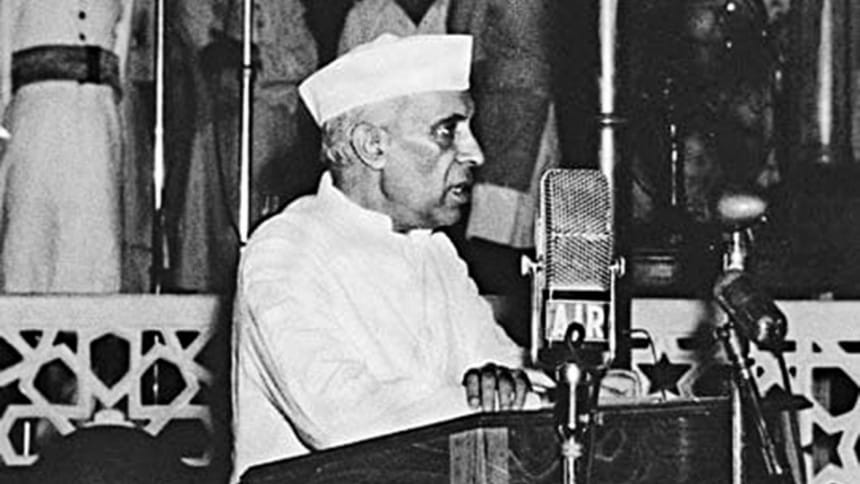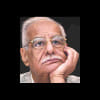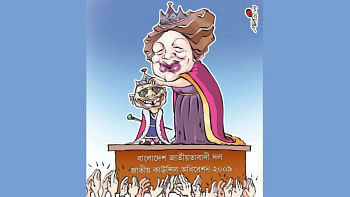Where did we go wrong?

I have always wondered where we went wrong. After adopting a constitution which was secular in letter and spirit, we have strayed into the territory where every pebble is an impediment to the journey towards pluralism. India's first Prime Minister, Jawaharlal Nehru, said on the night of August 14-15, 1947, in parliament and what became popularly known as "Tryst with Destiny" speech:
"The future beckons to us…We have hard work ahead. There is no resting for any one of us till we redeem our pledge in full, till we make all the people of India what destiny intended them to be. We are citizens of a great country on the verge of bold advance, and we have to live up to that high standard. All of us, to whatever religion we may belong, are equally the children of India with equal rights, privileges and obligations. We cannot encourage communalism or narrow-mindedness, for no nation can be great whose people are narrow in thought or in action…"
The Muslim leaders who spoke after Nehru were so emotionally surcharged that they out-rightly rejected the proposal of reservations in employment and educational institutions as were discussed in the Constitution Assembly which Sardar Patel, then Home Minister, was offering. The Muslim leaders said in both houses of parliament that they did not want anything separate or special. They regretted that they were misled and unwittingly sowed the seeds of partition.
Qaid-e-Azam Mohammad Ali Jinnah reportedly wanted more and more concessions for Muslims but not separation. But somewhere along, the demand for Pakistan came to be raised. It swept the Muslims off their feet.
Lord Mountbatten whom I have interviewed at length at Broadlands, near London, where he lived told me that Clement Atlee, the then Prime Minister, asked him to see if the two countries could have something in common. Jinnah categorically said no to the suggestion. He said he did not trust them now because after accepting the Cabinet Mission Plan, which provided a weak Centre, they had gone back on the arrangement of grouping where the Hindu-majority Assam was a part. Subsequently, they came to accept the Plan but Jinnah had lost confidence.
I was one of those fortunate people to be in parliament, sitting in the press gallery, and listening to Nehru making the "Tryst with Destiny" speech. That was 70 years ago. Today, when the head of a fanatic organisation, Rashtriya Swayamsevak Sangh (RSS), is looking to "consolidate" Hindu vote in state elections and in the coming general election in 2019, I ask myself: Where did we go wrong?
Mohan Bhagwat, the RSS chief, spent nearly a fortnight, travelling to Bihar and Uttar Pradesh, the two most populous states of the country, where caste fissures run deep and caste and religion arithmetic decides the fate of candidates. In other words, the political outcome at the centre is depended on the monolithic Hindu voters of the two states.
The RSS chief has been unequivocal while addressing the large crowd recently as he exhorted the Hindus to overcome the differences of caste. His remark was sharp and pointed when he said: "Hindus should be united. Division in society over caste and violence over the issues are the biggest hurdles in achieving this unity and there are forces that take advantage of it."
Apparently, the RSS chief had the non-Hindu voters in mind. Probably, his renewed push for consolidation had also something to do with the emergence of political entities like Jignesh Mevani after the attack on a Dalit family in Una and the rise of the Bhim Army, following clashes between Dalits and Rajputs in UP's Saharanpur. The RSS is said to believe that these are the groups that are covertly supported by the "ultra" Left.
Bhagwat during his speech also tried to stem the rot that has set in after the central government's recent economic policies which affected the farmers and small and medium enterprises which are against the BJP-led NDA. Though the RSS spokesman put up a brave front saying that the visit of the RSS chief was meant to meet the functionaries, it was reportedly to appease the voters as there is a sense of concern within the Sangh parivar over the possibility of caste groupings that could jeopardise the BJP chances at the Centre.
Its deep anxiety on the possibility of a Dalit-Muslim combine emerging in Bihar is understandable because it could cobble together a formidable opposition to upstage the BJP. Hence the RSS is seen building bridges and reaching out to the economically backward classes, particularly the Kurmi and Kori communities, from which it did not get support.
The visits of Bhagwat to Bihar and UP are meant to garner the support the BJP needs to renew their tenure at the Centre, apart from its plans to have the RSS presence in every village as the Sangh is planning to attract more people to its fold. The concerted efforts of RSS to woo the Hindus, with help coming from the Janata Dal (United) of Sharad Yadav, are very much a part of the push to sustain its hold.
The role of Bihar Chief Minister Nitish Kumar is deplorable. For the sake of protecting his government, he has accepted the support of divisive elements which he has fought against all his life. He has tried to defend his move to have the BJP along but it looks like a tamasha. A person who has categorical secular credentials, which was lauded by even the extreme left, has compromised his stand to stay in power.
The fact is that the secular forces have not been able to stem the tide of Hindutva. The Congress is too weak to get people to rededicate themselves to the Idea of India: A democratic and secular country. The BJP with Narendra Modi as Prime Minister looks formidable because the magic of Modi has not waned yet. Probably, the next election in 2019 may go his way. I only hope and pray that the nation would get back to the secular track.
Kuldip Nayar is an eminent Indian columnist.





Comments